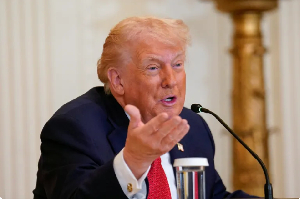Reports monitored across the country indicate that the toxic mix of 'dumsor' and high electricity tariffs being served on Ghanaians by the Mahama-led National Democratic Congress government continues to have a serious negative impact on businesses, resulting in massive job losses.
According to a study conducted by the Institute of Statistical, Social and Economic Research, Small and Medium Enterprises in Ghana now lose $2.2 million daily due to the power crisis.
Currently, 400 megawatts of power is being shed, in the midst of humungous electricity tariffs that have brought so much pressure on small scale businesses struggling to survive.
Reports say some businesses in Kumasi, Accra, Tema and Takoradi have once again begun laying off workers, with the resumed load shedding. Others that are finding it very difficult to continue their operations are planning to close down completely if the situation persists or deteriorates further.
The situation seems to have been worsened by the lack of a timetable to help power consumers in effective planning of their business activities.
In Accra, printing presses in New Town are among the worst hit. The bubbly busy business area has been rendered unusually quiet, with few companies operating with generators at increased cost of production.
This has compelled some of the companies to lay off professional workers, at least for the time being, while relying only on casual workers.
According to some of the business owners, the power outages are affecting their businesses in no small measure.
"It is creating a lot of problems for us. Those who have generators are moving forward. But those of us who don't have the money to buy generators, [the outages] is weighing our business down," myjoyonline.com quoted one of the business owners.
They say what has made matters worse for them is the absence of time table to regulate the outages.
"If we know that you will be getting off at this time, then you will schedule your things well. But we don't have any prior notice that the light will go off. But the time you realise it is gone off," a business man said.
The situation is not any different in the Western regional capital Takoradi where businesses are demanding a schedule to enable them plan their operations, according to Francis Whajah of Radio MAXX.
"Previously we were made aware of a schedule but of late there is no schedule. The light goes off as and when it wants. So we want a schedule because the thing is going on. We want a schedule," one of the business owners said.
"Our cost of running is rising higher and higher. Our biggest challenges have to do with the fact that we don't when the light will go off and when it will come on and that is really affecting planning," another said.
According to Solomon Kotei, General Secretary of the Industrial and Commercial Workers Union, the umbrella body for industries, his outfit is inundated with complaints from its members that the situation is negatively impacting their operations.
Meanwhile, Boakye Agyarko, Chairperson of the NPP's Campaign Sector Committee for Energy, says the party plans to establish a statutory body responsible for liquidity management system in the energy sector if it wins this year's elections and form the next government.
This, he explains, will ensure that the energy sector
becomes self-sustaining and self-financing to avoid the current frightening debts collapsing the sector.
The statutory body would be given the necessary powers and functions to discharge its duties effectively.
Just as the Central Bank is responsible for liquidity in the banking sector, so shall the liquidity management system be responsible for liquidity in the energy.
The body would resolve all the liquidity challenges in the energy sector which has plunged the nation into darkness.
It would also collect all electricity bills and pay all stakeholders their share through a cascading waterfall system, while being made responsible for disconnection of defaulting consumers.
"MANUAL VERIFICATION WITH BAD REGISTER WILL BE PROBLEMATIC"
Nana Yaw Dwamena
The decision by the Electoral Commission to allow manual verification in this year's elections could create avenues for manipulation, impersonation and vote rigging if the various flaws in the voters' register are not satisfactorily addressed, Martin Adjei-Mensah Korsah, Director of Elections of the New Patriotic Party has warned.
Political parties in the country under the Institute of Economic Affairs Ghana's Political Parties Programme called on the EC to maintain the 'no verification, no vote' regulation.
They made the recommendation, as part of their proposals for electoral reforms, after their representatives attended two workshops held for them by the IEA, to discuss and review Ghana's electoral system, with a view to proposing reforms in the wake of the problems that emerged after the 2012 general elections.
All the parties agreed that, the 'no verification, no vote' regulation, which was adopted in the 2012 general elections should be maintained and enforced in the 2016 elections.
But the EC, which did not agree with the political parties, is now pushing for a legislation to allow manual verification in the upcoming elections.
Strangely, the NDC which had earlier supported the other political parties in making the recommendations to maintain the 'no verification, no vote' regulation has suddenly made a U-turn to support the EC's decision.
According to Martin Adjei Mensah Korsah, the flaws in the electoral roll, which have been raised not only by the NPP, but the Supreme Court, the Justice VCRAC Crabbe panel and other parties, makes the current register 'porous.'
"If the register is porous, why do you want to allow manual verification? It is almost equal to say voting without verification. So now if we have gone ahead to do this, it is incumbent on us to make sure that the register is fit for purpose, because the problem that were brought up are partially resolved but not wholly," he stated in an interview with the Daily Statesman.
He disclosed that the NPP received a letter from the Chairperson of the EC, giving reasons why minors and other ineligible persons on the register will be difficult to ascertain because they all relied on the NHIS cards as a form of ID.
He added: "So, with all of these established flaws which remain unresolved, why do you allow manual verification against the wish of all parties, because the fact is that all the parties rejected it?
Business News of Friday, 15 July 2016
Source: Daily Statesman













